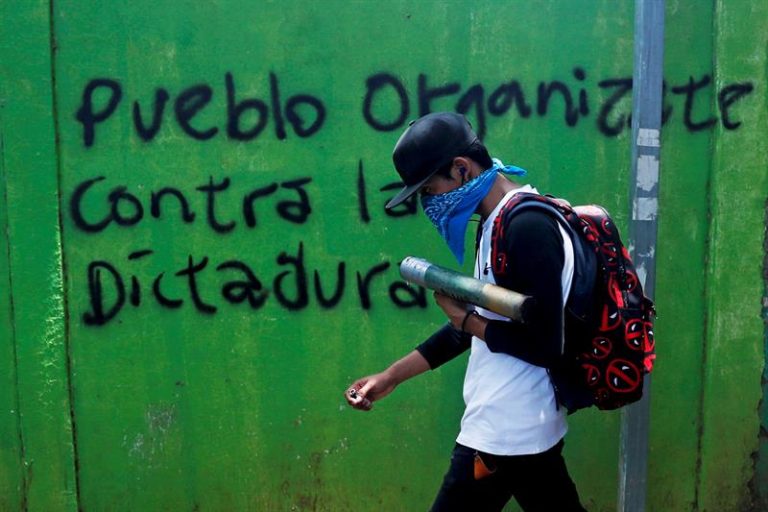24 de junio 2019

“NicaraguAmor” Cultural Caravan for Nicaraguans in the USA

PUBLICIDAD 1M
PUBLICIDAD 4D
PUBLICIDAD 5D
What is this modus vivendi? A way of life worse than a state of siege, in which the population is submitted to an arbitrariness that knows no law.

A young man during a demonstration against the Ortega government on September 15, 2018. Graffiti: People, organize against the dictatorship!
The outrages recently committed in the Catholic churches in Leon and Managua against Nicaraguans exercising their basic citizens’ rights, give us a good measure of Ortega’s plans for the immediate future. His hordes, who apparently enjoyed full impunity, had no respect for the cathedrals in either city.
The brazen police deployment and the obviously coordinated actions of groups that have been organized and trained for aggression, is part of the modus vivendi that Ortega plans to promote.
What is this modus vivendi? A way of life worse than a state of siege, in which the population is submitted to an arbitrariness that knows no law and no rights. That’s the normality that Ortega wants to support. And I say this because that’s the way in which we Nicaraguans have had to live over the past year.
Following the freeing of [a large part of] the political hostages, there were those whose hopes were raised for a change in the regime, a change that would make it possible to renew the conversations at the negotiating table from a reasonable foundation. But once again, as accustomed, Ortega slammed the door on this.
What is a State of Siege? A legal and political condition in which some of the citizen rights and guarantees assured in the Constitution are suspended. It’s decreed when there’s a state of war or a national emergency due to some catastrophe or exceptional threat. Since it’s an exceptional situation, it’s strictly regulated by the legal codes of each country.
In Nicaragua, Article 185 of the Constitution in force establishes the possibility of decreeing a suspension of constitutional rights, and Article 186 establishes the limits that the authorities must work within.
According to this article, in no case can the following rights be suspended: the right to life; respect for physical and moral integrity; the right to due process; the right to hold property; the right to freedom and personal security; the right not to be submitted to tortures nor degrading treatment. These rights, among others, can’t be suspended, not even during a state of siege.
Furthermore, the Constitution establishes that any decree that suspends the Constitutional rights and guarantees must be submitted to the consideration of the National Assembly within 72 hours of declaring it. The Assembly must then immediately proceed to confirm or deny it.
But in the case of Nicaragua, the Boss-man imposed a state of siege without even bothering to issue a decree or follow the procedures outlined in the Constitution. A Constitution, by the way, that he has reformed at his own whim. Worse yet, he disrespects the rights and freedoms that should legally remain in force, even under a state of siege.
In itself, and before all else, he annihilated the Constitutional norms and principles that form the essence of the rule of law in any country. He then went further in breaking the country’s international obligations and agreements.
What I’m going to say isn’t an exaggeration – it’s what political practice and theory teaches. What theory and legal practice teaches is that Ortega has affected a true coup d’etat. Specifically, a self-coup d’etat.
What’s a Coup? A coup has two characteristics: it annuls the Constitution and the institutional foundations of the state; and disallows citizens’ rights.
What’s a self-coup? It occurs when an authority effectively annuls the Constitution and the legal framework of a country and imposes a de facto regime.
Daniel Ortega has affected a true coup d’etat. If there’s a coup plotter in Nicaragua, it’s Daniel Ortega. He presides over a de facto government, in which he doesn’t recognize the Constitution, nor the laws, not the rights of the population, nor an order of international law, and his principal coercive force is an irregular army.
Under these conditions here are some reflections we might ponder:
The indispensable condition for negotiating early elections is that Ortega reestablish the full validity of the Constitution and the full exercise of citizen rights and responsibilities. To arrive at this point, there’s no other alternative except redoubling the national and international pressure.
Thank you for reading our English section, brought to you in collaboration with Havana Times. If you wish to subscribe to our English Weekly Newsletter, you can do it here. Please spread the word and share this link with your friends, family or contacts.
Regards,
Archivado como:
PUBLICIDAD 3M
Economista y abogado nicaragüense. Aficionado a la historia. Bloguero y conductor de la plataforma de comunicación #VamosAlPunto
PUBLICIDAD 3D